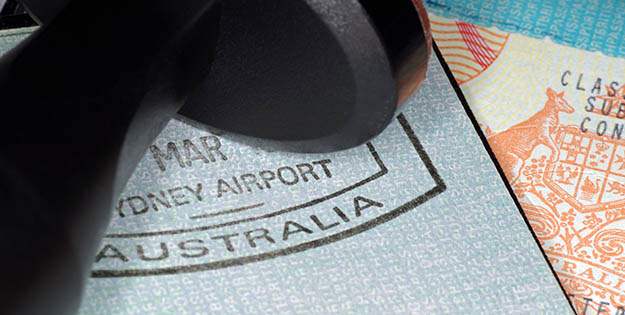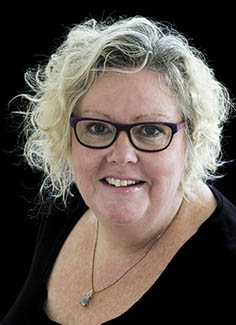Global
Copyright@ Australian Catholic University 1998-2026 | ABN 15 050 192 660 CRICOS registered provider: 00004G | PRV12008
Copyright@ Australian Catholic University 1998-2026 | ABN 15 050 192 660 CRICOS registered provider: 00004G | PRV12008

For near on a decade, Vivienne Withnall had been enjoying life in semi-retirement: the odd bit of overseas travel, time spent with family and friends, and new hobbies working with textiles and mastering the art of photography. Then one day, her son Eric, a Darwin-based lawyer, came home with a bright idea.
“My son had been doing a bit of migration law, and he said to me, ‘You know, Mum, this stuff would be so good for you. You’ve got such attention to detail, and you’ve got all the right skills, you really should give it a go’,” says Viv, 56.
“And I thought, ‘Oh, really? I’m quite enjoying retirement actually’.”
Secretly, however, her son’s suggestion intrigued her.
When Viv was in her teens growing up in Melbourne, her mother insisted she leave school to enter the workforce.
“Mum had had quite enough nonsense of my two older sisters going through school, so she decided she wasn’t going to put up with that again, and I’d be going off to work at age 15,” she says.
“I always knew this, from when I was a little girl. She said that if I wanted to go back to school as a mature-aged student, I could, but life got in the way and that never happened.”
The young Viv commenced an apprenticeship in hairdressing, and while she was rapt with the money and the autonomy it provided, she hated the work. She eventually found job satisfaction working in travel, an industry she stayed in happily and successfully for decades, owning travel agencies and other businesses and becoming a representative for industry groups.
However, despite having years of experience, a confident persona and a healthy dose of business acumen, Viv always felt like “a bit of a fraud” because she’d never completed formal education.
“Obviously I'm not a fool, but I just felt that something was missing,” she says. “I had always wanted to study law, I thought that would’ve been the go for me. But at age 54, I felt I’d left my run a bit late.”
Realising there was an itch that had yet to be scratched, Viv resolved to follow through on her son’s suggestion, and in 2019, she enrolled in Australian Catholic University’s Graduate Diploma in Australian Migration Law and Practice — a one-year fulltime course that aims to prepare students with the tools and skills required to practice as a qualified migration agent.
As with everything she becomes involved with, Viv threw all of her energy into her studies.
“It’s not an easy course, and me not having a background in higher education, I didn't have a good sense of the level of effort I’d have to put in,” she says. “A failure would’ve been more than I could cope with, so I just worked as hard as I could…”

At the end of a gruelling year of study, she passed the Migration Capstone Assessment, a notoriously difficult independent exam that checks whether candidates satisfy the standards a registered migration agent must meet to give immigration assistance.
“Viv got through that exam in a period where it was very difficult to pass,” says Philip Duncan, an experienced migration professional and educator, and the Discipline Leader of Migration Law and Practice at ACU.
“In my eyes, she’s a real success in terms of coming back to formal education, getting a graduate diploma, and turning that into something practical by becoming a migration agent and starting her own business.”
So, what do migration agents and lawyers actually do?
On a practical level, they assist aspiring migrants, employers and other sponsors, providing advocacy and advice on matters related to the migration process.
“We look at their situation and try to find a lawful pathway for them to enter and sometimes settle and start their new life in Australia,” says Viv Withnall, who opened her own practice, Arafura Migration, in March 2021.
“We also help when they run into trouble with the Department of Home Affairs with visa refusals and cancellations, and we can represent them at the Administrative Appeals Tribunal.”
At the heart of the profession, however, is a desire to help people.
In her many years working in the travel industry, Viv recalls occasionally dealing with people who had come into circumstances that were less than fortunate.
“I remember a great sense of pride when I was able to help them in the little ways that I did at the time,” she says. “It really tugged at the heart.”

Since becoming a migration agent, Viv has realised the depth behind the people she comes into contact with, and how gratifying it is to be able to help.
“It’s really been quite amazing,” she says, “and I think that deep down, what migration agents do is really just about helping people… it’s helping them during what is often an important and stressful time in their lives.”
Philip Duncan says that ACU’s Graduate Diploma in Australian Migration Law and Practice is aimed at both practicing lawyers who want to establish their migration law expertise, and those who don’t have a legal background but want to become migration agents.
“People come to the course with all kinds of imperatives – some want to work with in the refugee and protection sector, others want to work in the corporate sector,” Mr Duncan says.
“A lot of students come to the course because they’re migrants themselves and they want to be in a position to help migrants. That’s a very big driver amongst our students, and they leave the course ready to help people and make a positive impact on people’s lives.”
Vivienne Withnall says that completing the course, which is offered online, was “a fantastic experience”.
“It’s heavily law-based, really rigorous and a lot of hard work, but coming out the other end of it, it was rewarding and I only have positive things to say about it,” she says.
“I’ve learnt a lot and I’ve got a new career, and I’ve also re-established the confidence in myself that I can do it, that I’m not stupid, and at least I’ve got a little bit of an education now.”
As for her late mother, Vivienne is sure she would’ve been proud of her youngest daughter’s achievements.
“I’m sure my mum, who was insistent that I leave school so young, thought at the time she was doing the best thing for me,” she says.
“I am also sure that she would have been so very proud that I did in fact get to uni eventually, and was successful in completing the course, too. She would’ve been thrilled.”
Keen to make an impact on people lives and forge a career in migration law and practice? Explore the options.
Copyright@ Australian Catholic University 1998-2026 | ABN 15 050 192 660 CRICOS registered provider: 00004G | PRV12008